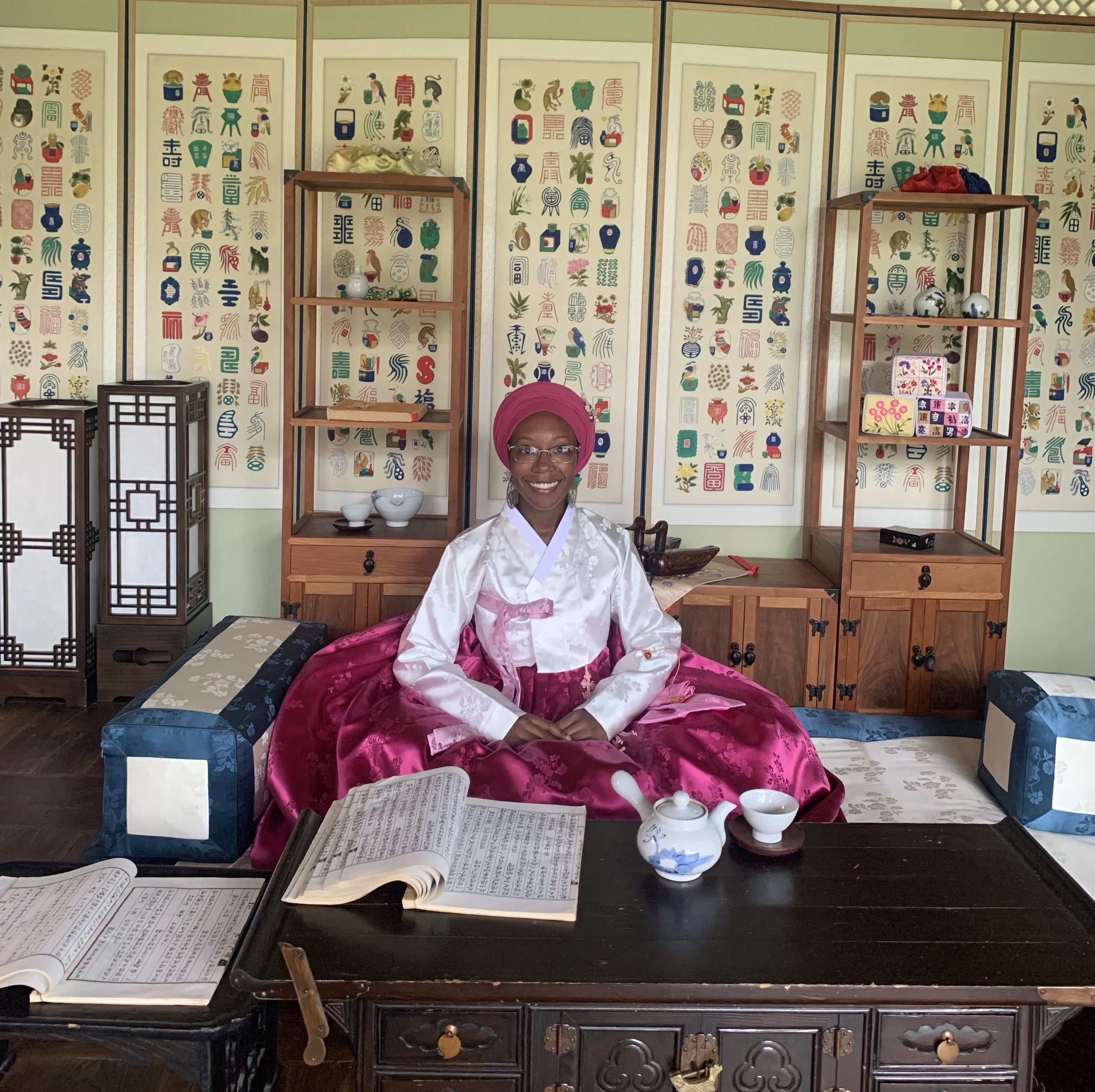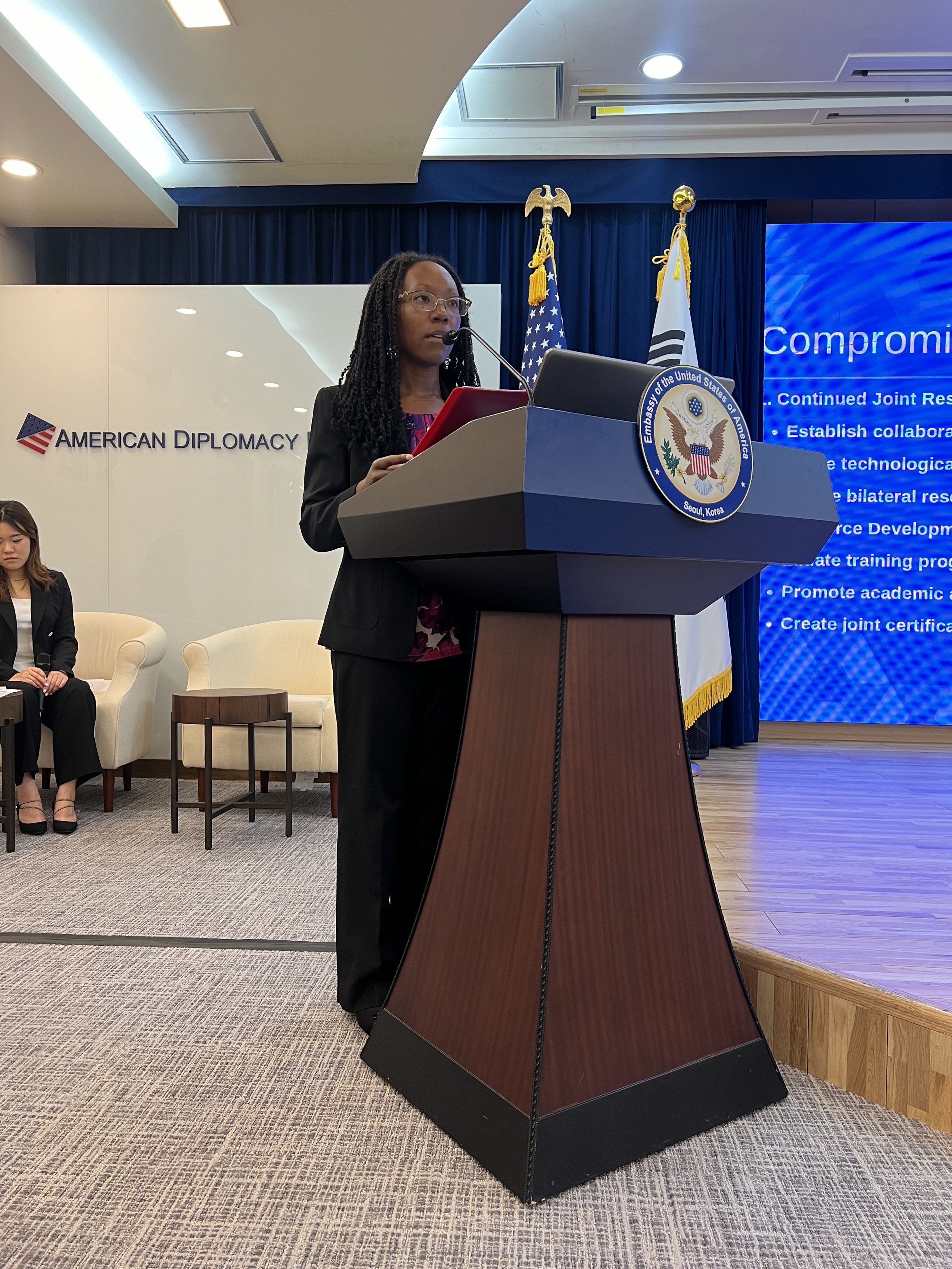From Detroit to Seoul: Hadiya Knight's Journey in Korean Studies
In the bustling academic landscape of Ewha Women's University in Seoul, you'll find Hadiya Knight, a Detroit native whose journey from violin prodigy to Korean Studies scholar exemplifies the spirit of cross-cultural exchange that NABEA champions.
Musical Beginnings
Caption: Hadiya Kight dressed in hanbok at a traditional hanok house in South Korea.
Hadiya's path to Korea began with music. Starting the violin at age five in Detroit, her parents sent her to summer music camps where she befriended Korean and Taiwanese American students who introduced her to their cultures through a shared love of music.
"Around that time, I was very interested in a kind of kaleidoscope of different music types," Hadiya recalls. "J-pop, K-pop, C-pop, Bollywood music. It was any and all things that were interesting to me."
By 2012-2013, before K-pop's global explosion, Hadiya had already begun teaching herself Korean through YouTube videos and PDF resources she found online. What started as a hobby would eventually shape her academic and professional trajectory.
Beyond the Music Stand
At Michigan State University, Hadiya crafted a unique academic identity, blending her violin performance major with a minor in African American and African Studies. She also joined the Korean Student Association, where her interest in the Korean language and culture flourished. After graduating in 2015, she worked as a music teacher for three years, followed by a role as a school secretary.
Her passion for Korean never waned. During this time, she continued her language studies with The Korea Society of New York, where she impressed instructors by testing into advanced classes. When their educational advisor recommended the University of Hawaii at Manoa's Korean flagship program, Hadiya took a leap of faith.
"I thought, well, let me just apply. You know, see how this goes," she says. That decision changed everything.
From Hawaii to Seoul
Caption: Hadiya Knight standing next to a Korean royal guard outside Gyeongbokgung Palace in Seoul, South Korea.
Accepted into the Korean for Professionals master's program—a two-year commitment split between Hawaii and Seoul—Hadiya packed her bags for Honolulu in August 2023, trading Midwest winters for Pacific island life. Her academic excellence earned her the prestigious Foreign Language and Area Studies (FLAS) fellowship from the U.S. Department of Education, which covered her tuition and provided a monthly stipend.
"That's the main reason why I'm here [in Seoul] for a year instead of a semester," Hadiya explains. The fellowship allows her to focus entirely on her studies without financial worries.
Currently in her capstone phase at Ewha Women's University in Seoul, Hadiya is nearing graduation but has no plans to leave Korea. Her next steps? Applying for a D-10 job seeker visa to work in Korea for up to 11 months before pursuing a PhD — potentially a six- to seven-year commitment to living and studying in the country.
Creating Community
Hadiya's journey to Korea wasn't just about academic pursuits — it was built on a foundation of community connections she began establishing years before.
While still working in education in Detroit, she took the initiative to create spaces where her passion could flourish. She started a Korean-English language exchange at her local library, unsure if anyone would come. To her surprise, about 12 to 13 people attended the first meeting.
"I found that there were so many other people who were just like me, who were very interested in Korea, who had maybe never been to Korea, but who had self-studied," she remembers. The group grew, sharing textbooks, YouTube recommendations, and even children's books donated by Korean members.
Caption: Hadiya Knight presenting as an American delegate for the Korea-America Student Conference (KASC).
This spirit of connection continued when Hadiya joined NABEA while serving as an American delegate at the Korea-America Student Conference (KASC) this past summer. Meeting NABEA's leaders in Washington, D.C., was a pivotal moment, connecting her to a community of Black professionals in Asian studies.
The Melody Continues
What motivates someone to pursue such a bold, international path? For Hadiya, it's honoring those who came before her.
"What motivates me to keep going is how much my parents poured into me. And I know by virtue of my parents pouring so much into me, their parents and their parents and their parents and their parents poured so much into them," she reflects. "So many people before me have prepared for this very moment when we are taking off in our fields and our studies."
Hadiya's advice for those interested in studying in Korea echoes her own journey: "Stay inspired. Find the things that keep you inspired and keep you motivated." Whether through podcasts, language partners, or community groups, the key is maintaining connection.
As she prepares to graduate and begin the next chapter of her academic journey, Hadiya Knight represents the future of Black engagement with Asia, building on foundations laid by pioneers like Howard and Sue Bailey Thurman while charting new paths in Korean studies and beyond.
This profile is part of NABEA's member highlight series, showcasing the diverse talents and experiences of our community.



